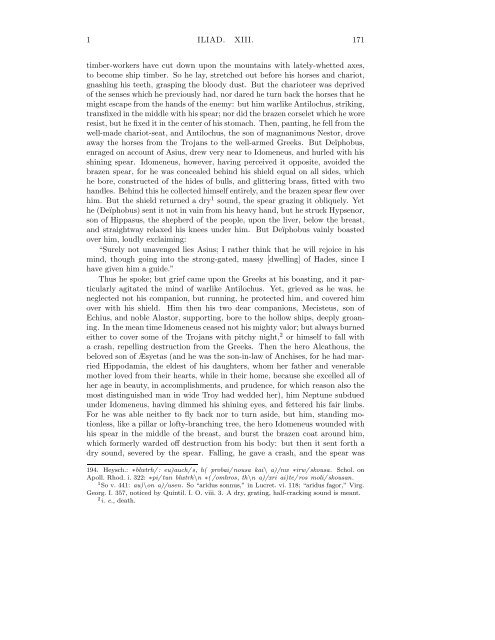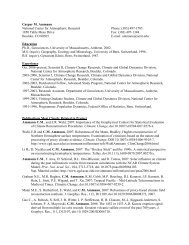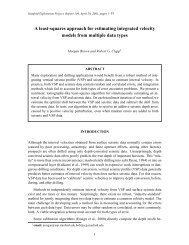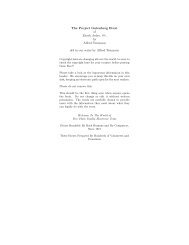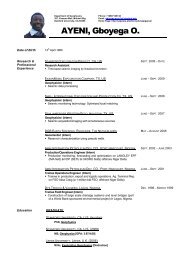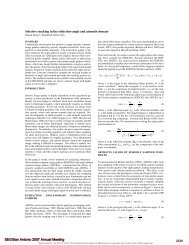The Project Gutenberg Etext of the Iliad of - Stanford Exploration ...
The Project Gutenberg Etext of the Iliad of - Stanford Exploration ...
The Project Gutenberg Etext of the Iliad of - Stanford Exploration ...
Create successful ePaper yourself
Turn your PDF publications into a flip-book with our unique Google optimized e-Paper software.
1 ILIAD. XIII. 171<br />
timber-workers have cut down upon <strong>the</strong> mountains with lately-whetted axes,<br />
to become ship timber. So he lay, stretched out before his horses and chariot,<br />
gnashing his teeth, grasping <strong>the</strong> bloody dust. But <strong>the</strong> charioteer was deprived<br />
<strong>of</strong> <strong>the</strong> senses which he previously had, nor dared he turn back <strong>the</strong> horses that he<br />
might escape from <strong>the</strong> hands <strong>of</strong> <strong>the</strong> enemy: but him warlike Antilochus, striking,<br />
transfixed in <strong>the</strong> middle with his spear; nor did <strong>the</strong> brazen corselet which he wore<br />
resist, but he fixed it in <strong>the</strong> center <strong>of</strong> his stomach. <strong>The</strong>n, panting, he fell from <strong>the</strong><br />
well-made chariot-seat, and Antilochus, <strong>the</strong> son <strong>of</strong> magnanimous Nestor, drove<br />
away <strong>the</strong> horses from <strong>the</strong> Trojans to <strong>the</strong> well-armed Greeks. But Deïphobus,<br />
enraged on account <strong>of</strong> Asius, drew very near to Idomeneus, and hurled with his<br />
shining spear. Idomeneus, however, having perceived it opposite, avoided <strong>the</strong><br />
brazen spear, for he was concealed behind his shield equal on all sides, which<br />
he bore, constructed <strong>of</strong> <strong>the</strong> hides <strong>of</strong> bulls, and glittering brass, fitted with two<br />
handles. Behind this he collected himself entirely, and <strong>the</strong> brazen spear flew over<br />
him. But <strong>the</strong> shield returned a dry 1 sound, <strong>the</strong> spear grazing it obliquely. Yet<br />
he (Deïphobus) sent it not in vain from his heavy hand, but he struck Hypsenor,<br />
son <strong>of</strong> Hippasus, <strong>the</strong> shepherd <strong>of</strong> <strong>the</strong> people, upon <strong>the</strong> liver, below <strong>the</strong> breast,<br />
and straightway relaxed his knees under him. But Deïphobus vainly boasted<br />
over him, loudly exclaiming:<br />
“Surely not unavenged lies Asius; I ra<strong>the</strong>r think that he will rejoice in his<br />
mind, though going into <strong>the</strong> strong-gated, massy [dwelling] <strong>of</strong> Hades, since I<br />
have given him a guide.”<br />
Thus he spoke; but grief came upon <strong>the</strong> Greeks at his boasting, and it particularly<br />
agitated <strong>the</strong> mind <strong>of</strong> warlike Antilochus. Yet, grieved as he was, he<br />
neglected not his companion, but running, he protected him, and covered him<br />
over with his shield. Him <strong>the</strong>n his two dear companions, Mecisteus, son <strong>of</strong><br />
Echius, and noble Alastor, supporting, bore to <strong>the</strong> hollow ships, deeply groaning.<br />
In <strong>the</strong> mean time Idomeneus ceased not his mighty valor; but always burned<br />
ei<strong>the</strong>r to cover some <strong>of</strong> <strong>the</strong> Trojans with pitchy night, 2 or himself to fall with<br />
a crash, repelling destruction from <strong>the</strong> Greeks. <strong>The</strong>n <strong>the</strong> hero Alcathous, <strong>the</strong><br />
beloved son <strong>of</strong> Æsyetas (and he was <strong>the</strong> son-in-law <strong>of</strong> Anchises, for he had married<br />
Hippodamia, <strong>the</strong> eldest <strong>of</strong> his daughters, whom her fa<strong>the</strong>r and venerable<br />
mo<strong>the</strong>r loved from <strong>the</strong>ir hearts, while in <strong>the</strong>ir home, because she excelled all <strong>of</strong><br />
her age in beauty, in accomplishments, and prudence, for which reason also <strong>the</strong><br />
most distinguished man in wide Troy had wedded her), him Neptune subdued<br />
under Idomeneus, having dimmed his shining eyes, and fettered his fair limbs.<br />
For he was able nei<strong>the</strong>r to fly back nor to turn aside, but him, standing motionless,<br />
like a pillar or l<strong>of</strong>ty-branching tree, <strong>the</strong> hero Idomeneus wounded with<br />
his spear in <strong>the</strong> middle <strong>of</strong> <strong>the</strong> breast, and burst <strong>the</strong> brazen coat around him,<br />
which formerly warded <strong>of</strong>f destruction from his body: but <strong>the</strong>n it sent forth a<br />
dry sound, severed by <strong>the</strong> spear. Falling, he gave a crash, and <strong>the</strong> spear was<br />
194. Heysch.: ∗blwtrh/ : eu)auch/ s, h( probai/ nousa kai\ a)/nw ∗irw/ skousa. Schol. on<br />
Apoll. Rhod. i. 322: ∗pi/ tun blwtrh\n ∗( /omhros, th\n a)/xri ai)te/ ros moli/ skousan.<br />
1 So v. 441: au)\on a)/usen. So “aridus sonnus,” in Lucret. vi. 118; “aridus fagor,” Virg.<br />
Georg. I. 357, noticed by Quintil. I. O. viii. 3. A dry, grating, half-cracking sound is meant.<br />
2 i. e., death.


